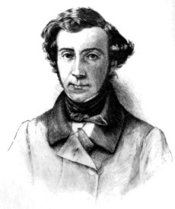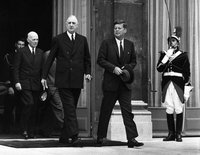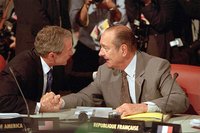Franco-American relations
|
|
fr:Histoire des relations franco-amťricaines Franco-American relations refers to interstate relations between France and the United States. Its groundwork was laid by the colonization of parts of the Americas by the European powers France and Great Britain.
| Contents |
Background
As long as England and France remained at peace in Europe, and as long as the precarious balance in the American interior survived, English and French colonies coexisted without serious difficulty. However, beginning in earnest following the Glorious Revolution in England (1688), the simmering dynastic, religious, and factional rivalries between the Protestant British and Catholic French in both Europe and the Americas triggered four "French and Indian Wars" fought largely on American soil (King William's War, 1689-1697; Queen Anne's War, 1702-1713; King George's War, 1744-1748; and, finally the Seven Years' War, 1756-1763). Great Britain finally ejected the French from continental North America in 1763 following French defeat in the Seven Years War. Yet, over a decade later, when the British colonies revolted, France retaliated by secretly supplying them with guns and other supplies.
France and the American Revolution
Lafayette_and_washington.jpg
After Congress declared independence in July 1776 its agents in Paris recruited officers for the Continental Army, notably the Marquis de Lafayette, who served with distinction as a major general. Despite a lingering distrust of France, the agents also requested an alliance. After readying their fleet and being impressed by the U.S. victory at the Battle of Saratoga in October 1777, the French in the following February concluded treaties of commerce and alliance that bound them to fight Britain until independence of the United States was assured.
The military alliance began poorly. French Admiral d'Estaing sailed to North America with a fleet in 1778, and began a joint effort with American General John Sullivan to capture a British outpost at Newport, Rhode Island. D'Estaing broke off the operation to confront a British fleet, and then, despite pleas from Sullivan and Lafayette, sailed away to Boston for repairs. Without naval support, the plan collapsed, and American forces under Sullivan had to conduct a fighting retreat alone. American outrage was widespread, and several French sailors were killed in anti-French riots. D'Estaing's actions in a disastrous siege at Savannah, Georgia further undermined Franco-American relations.
The alliance improved with the arrival of the Comte de Rochambeau in the United States in 1780. The French naval actions at the Battle of the Chesapeake made possible the crucial Franco-American victory at the Battle of Yorktown in October 1781, effectively ending the war.
In the peace negotiations between the Americans and the British in Paris in 1783 the American commissioners, Benjamin Franklin, John Adams, and particularly John Jay, suspected the French of a willingness to sacrifice the American interest in the Western territory extending to the Mississippi River and of being hostile to American fishing rights off Newfoundland. Thus, with Benjamin Franklin and John Adams, Jay violated the spirit of the alliance by directly bargaining with the British. Nevertheless, the allies cooperated to produce a treaty. In all, the French contribution to U.S. independence was decisive.
The French Revolution and neutrality
Charles_Maurice_de_Talleyrand.jpg
Six years later, the revolution that toppled the Bourbon regime dissipated some of the U.S. warmth for France. A crisis emerged in 1793 when France found itself at war again with Great Britain and its allies, this time after the French revolutionary government had executed King Louis XVI. The new federal government in the U.S. was uncertain how to respond. Should the United States recognize the radical government of France by accepting a diplomatic representative from it? Was the United States obliged by the alliance of 1778 to go to war on the side of France?
Washington (responding to advice from both Hamilton and Jefferson) recognized the French government, but did not support France in the war with Britain. Instead, the U.S. issued a proclamation in 1793 announcing the determination of the United States to remain at peace and (although it did not use the word) neutral. A year later, Congress passed a neutrality act forbidding U.S. citizens to participate in the war prohibiting the use of U.S. soil as a base of operation for either side. Thus, the revolutionary government viewed Washington's policy as partial to the enemy.
The first challenge to U.S. neutrality came from France, when its first diplomatic representative, the brash Edmond GenÍt, toured the United States to organize U.S. expeditions against Spain and Britain. Exasperated, Washington demanded GenÍt's recall, but by then the French Revolution had taken yet another turn and the new French ministers arrived to arrest GenÍt. Washington refused to extradite GenÍt (knowing he would otherwise be guillotined). GenÍt became a U.S. citizen and married Cornelia Tappan Clinton, daughter of New York governor George Clinton.
France regarded Jay's Treaty (November 1794) between Britain and the United States as hostile. The British agreed to withdraw troops from the Northwest Territory in return for a renewed commitment by the United States that debts incurred before the American Revolution would be paid.
To overcome this resentment John Adams in 1797 sent a special mission to Paris. Meanwhile, Charles Maurice de Talleyrand-Pťrigord, the French foreign minister, offered a bribe to U.S. commissioners. Adams exposed the episode, known as the "XYZ Affair," which angered Americans.
Tensions with France increased to the point that the period is described as an undeclared war. Two years of hostilities at sea, or the "Quasi-War", followed. The Federalists imposed severe restrictions on French sympathizers in the Alien and Sedition Acts. It ended in September 1800 with the Treaty of Morfontaine, which rid the United States of the "entangling" French alliance.
At the same time, Napoleon Bonaparte regained the Louisiana territory from Spain, leading Thomas Jefferson to consider war to prevent French control of the Mississippi River.
At first, though, he sent Secretary of State James Monroe to France to buy as much of the land around New Orleans as he could. Surprisingly, Napoleon agreed to sell the entire territory. Because of an insuppressible slave rebellion in St. Domingue, among other reasons, Bonaparte's North American plans collapsed. To keep Louisiana out of British hands in an approaching war he sold it in April 1803 to the United States for $15 million. The size of the United States was doubled without going to war.
A foreign crisis loomed as warring Britain and France challenged U.S. neutrality and desire to trade with both nations. In their warfare, the French infringed on U.S. maritime rights, but less than did the British. President Thomas Jefferson signed the Embargo Act, which forbid all exports and imports. Designed to hurt the British, it hurt U.S. commerce far more. The destructive Embargo Act, which had brought U.S. trade to a standstill, was rescinded in 1809, although both Britain and France remained hostile to the United States.
However, in 1812 the United States declared war on Britain and fought indirectly in the War of 1812 as an ally of France.
Franco-U.S. relations, 1812-1914
In 1834 when Andrew Jackson demanded payment for property destroyed during the Napoleonic Wars, France severed diplomatic relations. After the incident subsided, modest cultural exchanges resumed, as in visits to the United States by Gustave de Beaumont and Alexis de Tocqueville, the author of Democracy in America (1835).
During the Civil War, the U.S. believed that Napoleon III favored the seceding Southern states. Furthermore, Napoleon III took advantage of the war in 1863, when he installed Austrian archduke Maximilian of Habsburg on the throne in Mexico. The United States protested and refused to recognize the new government but did not use the Monroe Doctrine out of fear that France would aid the South. In 1865 the U.S. used increasing diplomatic pressure to persuade Napoleon III to end French support of Maximilian and to withdraw French troops from Mexico.
In subsequent years the balance of power in the relationship shifted in favor of the United States. The U.S., rising to the status as a great power, came to overshadow France. All during this period the relationship remained firm—as symbolized by the Statue of Liberty, presented in 1884 as a gift to the United States from the French people. In 1906, when the German Empire challenged French influence in Morocco (see Tangier Crisis and Agadir Crisis), U.S. President Theodore Roosevelt sided with the French.
The Great War and the peace settlement
During the First World War, the United States joined France as a cobelligerent and provided much-needed reinforcements to the beleaguered country.
Wilson.jpg
In the peacemaking, however, though sharing major objectives, the two countries clashed over particulars. The burning ambition of French Premier Georges Clemenceau was to secure the security of France in the future; his formula was restitution, reparations, and guarantees. Clemenceau had little confidence in what, to him, were the unrealistic and utopian principles of U.S. President Woodrow Wilson, observing, "Even God was satisfied with Ten Commandments, but Wilson insists on fourteen (a reference to Wilson's "Fourteen Points")." The two nations clashed on debts, reparations, and restraints on Germany.
Clemenceau was also determined that a buffer state consisting of the German territory west of the Rhine should be established under domination of France. In the eyes of the U.S. and British representatives, such a crass violation of the principle of self-determination would only breed future wars; and a compromise was therefore offered Clemenceau, which he accepted. The territory in question was to be occupied by Allied troops for a period of from five to fifteen years; and a zone extending fifty kilometers east of the Rhine was to be demilitarized. In addition, Wilson and British Prime Minister David Lloyd George agreed that the United States and Great Britain, by treaty, would guarantee France against aggression. The importance of this pledge cannot be overstated.
Interwar years
During the interwar years, the two nations remained friendly. Beginning in the 1920s, U.S. intellectuals, painters, writers, and tourists were drawn to French art, literature, philosophy, theater, cinema, fashion, wines, and cuisine. In turn, U.S. novelists such as William Faulkner and numerous filmmakers influenced French life.
In 1928 the two nations sponsored the Kellogg-Briand Pact outlawing war, and in the thirties both favored capitalism over socialism. In the Second World War the U.S. again favored France in opposition to Germany. Franklin D. Roosevelt aided the French with cash, munitions, and supplies. Relations cooled, however, when defeated France in June 1940 established a fascist regime at Vichy. After the United States entered the war its forces attacked Vichy's bases in North Africa.
Postwar years
In the postwar years both cooperation and discord persisted. The United States helped revive the French economy with Marshall Plan aid and in 1949 again became a formal ally through the North Atlantic treaty, but it disapproved of French efforts to regain control of colonies in Africa and Southeast Asia. In 1954, for instance, U.S. President Dwight D. Eisenhower refused to intervene in Vietnam to back besieged forces at Dien Bien Phu.
Both countries opposed the Soviet Union in Cold War confrontations but went through another crisis in 1956. When France, Britain, and Israel attacked Egypt, which had recently nationalized the Suez Canal and shown signs of warming relations with the Soviet Union and China, Eisenhower forced them to withdraw.
After Charles De Gaulle became president he clashed with the U.S. over France's building of its own nuclear weapons and Britain's admission into the European Economic Community. When France was refused equal status in role in the North Atlantic Treaty Organization (NATO) it pulled out of this organization's military command. De Gaulle's foreign policy was centered around an attempt to limit the power and influence of both superpowers, and at the same time increase France's international prestige. De Gaulle hoped to move France from being a follower of the United States to a leading First World power with a large following among certain non-aligned Third World countries. The nations de Gaulle considered potential participants in this grouping were those in France's traditional spheres of influence: Africa and the Middle East.
Relations improved somewhat under de Gaulle's successors, but tensions reappeared intermittently. France, more strongly than any other nation, has seen the European Union as a method of counter-balancing American power, and thus works towards such ends as having the Euro challenge the preeminent position of the United States dollar in global trade. Overall, the U.S. has much closer relations with Great Britain.
While no major crises marred the following decades, the two nations differed over the waging of the Vietnam War, in part because French leaders were convinced that the United States could not win. In the eighties the two nations cooperated on most international matters, though at the end of the decade popular opinion within each differed on the desirability of a reunified Germany.
France, along with the People's Republic of China and Russia, all permanent members of the Security Council, opposed the proposed new U.N. resolution authorizing the U.S. invasion of Iraq on March 11, 2003. [1] (http://www.cnn.com/2003/WORLD/meast/03/11/sprj.irq.main/) French foreign minister Dominique de Villepin emerged as a prominent critic of the George W. Bush administration's policies pertaining to Iraq. However, despite the recurring rifts, the often ambiguous relationship remained stable.
Attempts made by ardent advocates of the U.S. position in Iraq to boycott French goods ultimately fizzled out having had little impact. A leader of the successful opposition in the Pennsylvania House of Representatives to the banning of all sales of French wine, Rep. Mark B. Cohen of Philadelphia, said that ultimately the France-bashing failed because "The American people understood that France was an independent country which had been helpful to the U.S. at key times in important ways, and Americans simply did not believe either in restricting their own consumer rights or in politicizing trade with other countries."
See also
- Freedom fries - An attempt to rename French fries
- Anti-French sentiment in the United States
- Old Europe
- Foreign relations of France
- Foreign relations of the United States
- Transatlantic relations
Further reading
- Philippe Roger (trans Sharon Bowman, 2005), The American Enemy: the history of French anti-Americanism, University of Chicago Press



